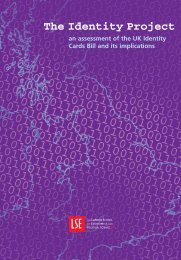Money Laundering: Review of the Reporting ... - Dematerialised ID
Money Laundering: Review of the Reporting ... - Dematerialised ID
Money Laundering: Review of the Reporting ... - Dematerialised ID
Create successful ePaper yourself
Turn your PDF publications into a flip-book with our unique Google optimized e-Paper software.
kpmg<br />
<strong>Review</strong> <strong>of</strong> <strong>the</strong> regime for handling Suspicious Activity Reports<br />
Report <strong>of</strong> recommendations<br />
KPMG LLP<br />
7 Improving <strong>the</strong> quality <strong>of</strong> reporting <strong>of</strong> SARs<br />
7.1 Summary<br />
7.1.1 This section <strong>of</strong> our report sets out our recommendations to improve <strong>the</strong> quality <strong>of</strong> SARs<br />
being submitted to ECB and ensure that <strong>the</strong> right information reaches LEAs. This is<br />
divided between:<br />
• Education by ECB <strong>of</strong> stakeholders on typologies and quality issues (section 7.2).<br />
• Inclusion <strong>of</strong> mandatory fields in <strong>the</strong> standard form <strong>of</strong> disclosure, encouraging<br />
disclosing entities to alert ECB about high impact SARs and encouraging electronic<br />
reporting (section 7.3).<br />
• Increasing feedback to disclosing entities through rejection <strong>of</strong> poor quality SARs,<br />
contact with <strong>the</strong> regulators, periodic reports by ECB on <strong>the</strong> performance and outcome<br />
<strong>of</strong> SARs and on market-wide issues, and regular feedback from LEAs to ECB on<br />
individual SARs and generic typologies (section 7.4).<br />
• Analysis by ECB <strong>of</strong> providers <strong>of</strong> SARs in order to identify <strong>the</strong> weakest points in <strong>the</strong><br />
financial system (section 7.5).<br />
7.2 Education regarding <strong>the</strong> SAR regime<br />
Recommendation 11<br />
Education role for ECB, trade bodies and o<strong>the</strong>r interested stakeholders<br />
7.2.1 There is a clear need for improving <strong>the</strong> general level <strong>of</strong> awareness <strong>of</strong> <strong>the</strong> scope and<br />
requirements <strong>of</strong> <strong>the</strong> SAR regime across all potential providers <strong>of</strong> SARs. This would<br />
ensure that all relevant entities become familiar with <strong>the</strong>ir statutory obligations and <strong>the</strong><br />
recent changes under PoCA and that <strong>the</strong>y are compliant with <strong>the</strong>se obligations in ways<br />
consistent with <strong>the</strong> recommendations <strong>of</strong> this report in order to reduce <strong>the</strong> amount <strong>of</strong> overand<br />
under-reporting and poor quality reporting. Appropriate liaison should take place<br />
between <strong>the</strong> different stakeholders to ensure a clear and joined up message is provided.<br />
7.2.2 The LU should continue to provide training and seminars itself, and speakers to external<br />
training sessions and conferences on issues <strong>of</strong> current concern. In doing so it should act<br />
as <strong>the</strong> public face <strong>of</strong> ECB in actively participating in training days and seminars organised<br />
by trade associations and external training providers to emphasise both <strong>the</strong> importance <strong>of</strong><br />
quality reporting and <strong>the</strong> role and scope <strong>of</strong> ECB to allow <strong>the</strong> maximum possible exchange<br />
<strong>of</strong> experiences and knowledge. It should also communicate areas <strong>of</strong> best practice to <strong>the</strong><br />
external providers <strong>of</strong> training for <strong>the</strong> various financial and o<strong>the</strong>r industries to ensure that<br />
this is disseminated as widely as possible.<br />
7.2.3 The various trade bodies for industries affected by <strong>the</strong> new MLRs and PoCA will also<br />
continue to play a key role in <strong>the</strong> education <strong>of</strong> <strong>the</strong>ir members, particularly those brought<br />
into <strong>the</strong> MLR net for <strong>the</strong> first time. The requirements <strong>of</strong> <strong>the</strong> regulators, and particularly<br />
<strong>the</strong> FSA, on <strong>the</strong> provision <strong>of</strong> training for staff are important.<br />
jo/fh/519 63









